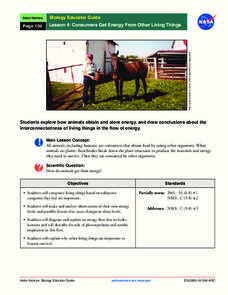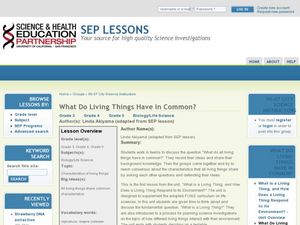Baylor College
Needs of Living Things: Post-Assessment
Assess your class's knowledge of the needs of living things with the final lesson in a series. Given a large piece of paper and coloring utensils, young scientists draw a picture of themselves and a plant or animal of their choosing,...
Curated OER
Basic Needs of Living Things - Lesson Two
Fourth graders study and identify the basic needs of a variety of organisms. Terrariums and aquariums are used to demonstrate what plants, animals, and fish need to stay alive. These two classic models are used to effectively convey what...
Curated OER
Basic Needs of Living Things - Lesson One
An interesting way of teaching about basic needs of different organisms awaits your fourth graders. Pupils take part in class discussions and demonstrations which should lead to a greater understanding of how to determine basic needs. As...
Baylor College
Needs of Living Things: Pre-Assessment
Determine your class's prior knowledge about the necessities of life with this pre-assessment for a unit on living things. Learners draw pictures of themselves with all the things they need to live, grow, and survive. These drawings will...
Curated OER
Can Young Children Distinguish Between Living and Non-living Things?
What does it mean to be living? Help your young scientists identify living and non-living things as a result of their learning through discovery. Observation of and interaction with a set of natural phenomena in their community will make...
Curated OER
Living and Non-Living Things
Take a walk and observe living and non-living things on the way. Young scientists practice making valuable observations and draw the details. You could require that your students complete a T chart of living and non-living things and...
Science Matters
Basic Needs
Scholars take part in a grand conversation about the basic needs of living things. Working collaboratively, pupils brainstorm and identify similarities to come to the conclusion that the environment meets the needs of all living things.
North Clackamas Schools
Sorting Living and Nonliving Objects
Is a rock living? How about lima beans? You'll find everything you need for an interactive sorting activity exploring living and non-living things.
Curated OER
Basic Needs of Living Things-Lesson One
Fourth graders explore the basic needs of living things. They observe a variety of living things and identify the basic needs of each living item. Students create food balls of peanut butter and nuts to feed animals. They hang their food...
Curated OER
Living and Nonliving Things
Students photograph five objects from a bag and five objects from the outdoors. Students categorize things by living and non-living and by properties such as color, size, structure and needs. Students draw conclusions about the basic...
Curated OER
When Ants Fly
Here is a great lesson on constructing line graphs. Learners identify common characteristics of birds, ants common needs of all living things. They also write a story from the perspective of an ant or a bird that has lost its home and...
Georgia Department of Education
Living Things/ Nonliving Things
How can you tell if something is living or nonliving? Introduce a set of criteria which can be used to determine which things are alive and which are not. The class discusses the basic needs of all living organisms, checks out an...
Captain Planet Foundation
Rotting Away
What happens at the end of a plant's life cycle? Show kids the natural way that plants show that they're decomposing, as well as the importance of compost, with a lesson about living organisms. After reading Log Cabin by Anne Schreiber,...
Baylor College
Need or Want?
Even as adults it can be hard to distinguish needs from wants. Using pictures of common, everyday items, children make a pocket chart separating the objects they need from those that they want. Discuss their choices, explaining that...
Baylor College
Living Things and Their Needs: The Math Link
Enrich your study of living things with these cross-curricular math activities. Following along with the story Tillena Lou's Day in the Sun, learners will practice addition and subtraction, learn how to measure volume and length, work on...
Curated OER
Needs of Living Things
Students discuss and explore the needs of living things. They choose to create a slide show with captions, create a web showing the needs of one Organism using KidPix. or make picture book by hand or using Microsoft Publisher.
Curated OER
Feed Me!
When youngsters are learning about the basic needs of humans and animals, this instructional activity could come in handy. In it, pupils circle the pictures of a living thing that is eating food. There are eight pictures all in all, and...
NASA
Consumers Get Energy From Other Living Things
How do plants and animals get their food? Learn about where energy comes from, how animals store energy, and aerobic respiration, in a instructional activity that allows scholars to diagram energy flows.
Curated OER
Living or Non-Living
Students examine living and non-living things. In this life science instructional activity, students are given a group of objects and discuss if they are living or non-living. Students identify and list characteristics of living things.
Curated OER
Living things
In this living things worksheet, students color the pictures of living things. Students circle 3 pictures and have 5 to choose from.
Curated OER
Science - What do living things need?
In this living things worksheet, students answer questions that ask what living things need. Students answer 10 questions in the true and false and short answer format.
Curated OER
Living and Non Living Things
First graders identify the characteristics of living and non living things. In this living and non living things lesson plan, 1st graders look through bags and categorize items that they see.
Curated OER
What Do Living Things Have In Common?
Students explore the concept of classification. In this classification lesson, students collaborate to create lists of living thing similarities in order to differentiate between living and non-living things. Students create a list of...
Baylor College
Needs of Plants
What better way to learn about plant life than by creating a class garden? Young botanists start with a brief discussion about radishes before planting seeds and watching them grow. To determine the importance of water, sunlight, and...

























